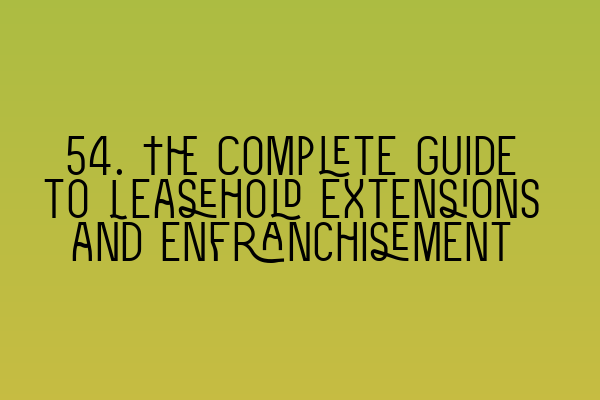54. The Complete Guide to Leasehold Extensions and Enfranchisement
Welcome to SQE Property Law & Land Law’s comprehensive guide to leasehold extensions and enfranchisement. In this guide, we will provide you with all the information you need to know about extending your lease or enfranchising your property. So, whether you are a leaseholder looking to extend your lease or a freeholder considering enfranchisement, this guide is for you. Let’s dive in!
1. Understanding Leasehold Extensions
Leasehold extensions allow leaseholders to extend their lease beyond the initial term specified in the lease agreement. As a leaseholder, it is important to be aware of your rights and options when it comes to extending your lease. With a leasehold extension, you gain increased control and flexibility over your property.
There are various reasons why leaseholders may choose to extend their lease. One common reason is to increase the market value of the property. Properties with shorter lease terms may be less attractive to potential buyers, so extending the lease can make the property more marketable.
Additionally, leaseholders may choose to extend their lease to gain peace of mind and security. A longer lease term provides stability and allows leaseholders to enjoy their property without the fear of it reverting back to the freeholder once the lease expires.
To successfully extend your lease, several steps need to be followed. These include determining your eligibility, calculating the premium, serving the appropriate notices, and negotiating the terms with the freeholder. It is advisable to seek professional legal advice to ensure the process is carried out correctly.
For detailed information and guidance on leasehold extensions, check out our SQE 1 Practice Mocks FLK1 FLK2 article.
2. The Process of Enfranchisement
Enfranchisement, also known as collective enfranchisement, refers to the process by which leaseholders collectively purchase the freehold of their property. This process allows leaseholders to take control of the management and ownership of their building.
Enfranchisement can be a complex process, involving numerous legal requirements and obligations. It is essential to understand the steps involved and seek professional advice to ensure compliance with the relevant legislation.
The first step in the enfranchisement process is ensuring that the building qualifies for enfranchisement. This typically requires a minimum number of qualifying leaseholders and adherence to specific eligibility criteria.
Once eligibility is established, the next step is to form an enfranchisement company. This company will act on behalf of the leaseholders to purchase the freehold from the current freeholder. The company’s formation requires careful consideration and expert advice to ensure compliance with company law.
After the enfranchisement company is established, the leaseholders will need to serve the appropriate notices on the freeholder, detailing their intention to exercise their right to enfranchise. The freeholder will then have a specified period to respond and negotiate the terms of the enfranchisement.
Valuation is another crucial aspect of enfranchisement. The leaseholders and freeholder must agree on a fair price for the freehold acquisition. Valuation methods can vary, so it is essential to engage a qualified valuer to determine a reasonable premium.
Our SQE 2 Preparation Courses offer in-depth knowledge and practical guidance on the enfranchisement process, ensuring you are equipped with the necessary skills to navigate this complex area of law.
3. The Role of a Solicitor in Leasehold Extensions and Enfranchisement
When it comes to leasehold extensions and enfranchisement, it is highly recommended to seek professional legal advice from a solicitor specializing in property law. A solicitor can guide you through the entire process, ensuring compliance with the relevant legislation and protecting your rights as a leaseholder or freeholder.
A solicitor will assist you in various ways, including:
- Assessing your eligibility for leasehold extension or enfranchisement
- Calculating the premium and negotiating with the freeholder
- Serving the necessary notices in accordance with legal requirements
- Advising on valuation matters and engaging qualified valuers
- Drafting and reviewing documents, such as lease extension agreements
By engaging a solicitor, you can navigate the complexities of leasehold extensions and enfranchisement with confidence, knowing that your rights and interests are protected.
If you require legal assistance or would like to learn more about our property law services, please contact our team at SQE Property Law & Land Law.
For more information on how to prepare for your SQE exams, check out our SQE 1 Practice Exam Questions and SQE 1 Practice Mocks FLK1 FLK2 articles. Stay up-to-date with the latest SRA SQE exam dates on our website.
Disclaimer: This blog post is for informational purposes only and should not be considered legal advice. Please consult a qualified solicitor for advice tailored to your specific situation.
